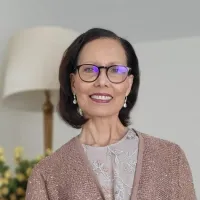Solid Ground Topics
"Building Leadership, Purpose, and Healing on Unshakable Truth"

Pastor Zondi and Dr. Robinson
This blog post continues my blog series' Reflections on South Africa.' I combined Part 7 and Part 8 to complete the eight-part series.
The original questions I asked and answered during that trip in 2022 are below. Why is racial healing needed, particularly at this undefinable epoch? How can racial healing and leadership, a potent combination, rise to meet some of the unforeseen challenges we will likely face in the next several years?
PART 7: Vital Leadership
The vital leadership lessons from South Africa are:
Our world is crying out for the type of leader who leads from a place of conviction, love, and courage.
Mandela, Archbishop, Dr. Alan, and Pastor Zondi exemplified these qualities. (These qualities emanated from Dr. Alan and Pastor Zondi while in their presence.
Good people are sometimes not good leaders.
I first heard this from our Robben Island tour guide about President Mandela. However, I am in no position to judge President Mandela's tenure as president of South Africa. But when I think of pastors, CEOs, and first-line supervisors, I can say from first-hand experience that some should probably step down from leadership. It's essential as a leader to know oneself because you will not flourish in every lane.
Train others to carry on the legacy of your work.
It is evident from listening to Edwin at the Museum that Archbishop Tutu had trained others to carry his spark (his work), and the Museum itself was a testament to his legacy. Tutu's work was so encompassing and far-reaching that it could not be completed in his lifetime. He realized this and wrote about the unfinished business regarding the Truth and Reconciliation Commission (TRC) work.
The idea of legacy brings me to the fourth lesson reinforced in South Africa. When you are operating in what God has given you - it can be a lifetime passion or commitment.
Each man, Mandela, Archbishop, Dr. Alan, and Pastor Zondi, lived and breathed their love for seeing a better world. [1]
PART 8: Epilogue Unfinished Business
Bishop Tutu bemoaned the fact that few, if any, recommendations from the TRC had been implemented, and he wrote about the unfinished business of apartheid. The TRC commission did the work with the understanding that those in power agreed and would implement proposed changes. South Africa even had its first Black president, Mandela. Yet, it didn't take long for those agreements to be discarded and rolled back. During my visit, it was apparent that South Africa provided separate but unequal services for its citizens and surrounding communities. It was evident from the speakers, the tour guides, and the physically segregated areas. (I've included a picture that reflects the differences in living between Black versus White South Africans.)

In addition, it is evident to me that the unraveling of the TRC agreements to rectify the impact of the years of apartheid is in many ways like the dismantling of the Reconstruction agreements after the Civil War and replacing with the Jim Crow era in America.
Although there were gains in America with the Civil Rights and Voting Rights Act in 1963 and 1964, in the past 10 years, there has been a full-on assault on those rights. A few examples worth mentioning are:
Voting rights have been severely impacted due to changes in voter ID laws and other obstacles placed on minority access to the polls.
In politics, the use of gerrymandering is to dilute and suppress the Black vote.
In educational systems, the blight of many inner-city schools and school vouchers are used to pay for the private segregated academies.
In the prison system, the higher incarceration rates for Black men.
In the healthcare system, Black women are more likely to die in childbirth.
In housing, redlining laws still dictate what neighborhoods a Black person can live in.
The American Christian church and the blatant nationalist (white supremacy) movement dominate the narrative, and it is still the most segregated place on Sundays.
The infection of racism runs deep in our fabric as a nation, and the Church has not been immune – in fact, it has been complicit in its spread.
Conclusion
Where do we go from here? Unless you live on a stranded island in the South Pacific, it is evident that racism is still a significant factor that divides us in America. Fortunately, the Church can still be a part of the solution to help transform our culture and set this country on a higher trajectory of racial healing and reconciliation. It will not be easy. It is not for those who will capitulate at the slightest obstacle. What is required are differentiated leaders who are self-aware, vulnerable, authentic, determined, discerning, and leaders who have the heart of God for His people. Most importantly, leaders will tell the truth even when it is unpopular.
What is the alternative? The laws and politics of this country have clearly demonstrated that while they may recommend solutions to these wicked problems, they have failed. And so, we find ourselves at this critical juncture in politics and in our Church. Because my lane is to help equip the body of Christ – my focus is helping to bring Christians to the table to have thoughtful, transformative, and timely conversations on race relations. Will you join me in igniting the difficult yet necessary conversations on racism? If so, contact me at [email protected] for more information on the Reconciliation Blueprint TM.
[1] Nelson Mandela, Long Walk to Freedom: The Autobiography of Nelson Mandela (New York: Back Bay Books, 1994) 622-623.

